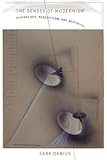The Senses of Modernism : Technology, Perception, and Aesthetics / Sara Danius.
Material type: TextPublisher: Ithaca, NY : Cornell University Press, [2019]Copyright date: ©2002Description: 1 online resource (264 p.) : 12 halftonesContent type:
TextPublisher: Ithaca, NY : Cornell University Press, [2019]Copyright date: ©2002Description: 1 online resource (264 p.) : 12 halftonesContent type: - 9781501721168
- 801.93
- online - DeGruyter
| Item type | Current library | Call number | URL | Status | Notes | Barcode | |
|---|---|---|---|---|---|---|---|
 eBook
eBook
|
Biblioteca "Angelicum" Pont. Univ. S.Tommaso d'Aquino Nuvola online | online - DeGruyter (Browse shelf(Opens below)) | Online access | Not for loan (Accesso limitato) | Accesso per gli utenti autorizzati / Access for authorized users | (dgr)9781501721168 |
Frontmatter -- Contents -- Acknowledgments -- Abbreviations -- Introduction: Orpheus and the Machine -- 1. The Antitechnological Bias and Other Modernist Myths: Literature and the Question of Technology -- 2. Novel Visions and the Crisis of Culture: The Cultivation of the Interior in The Magic Mountain -- 3. The Education of the Senses: Remembrance of Things Past and the Modernist Rhetoric of Motion -- 4. The Aesthetics of Immediacy: Ulysses and The Autonomy of the Eye and the Ear -- Coda: The Legibility of the Modern World -- Notes -- Index
restricted access online access with authorization star
http://purl.org/coar/access_right/c_16ec
In The Senses of Modernism, Sara Danius develops a radically new theoretical and historical understanding of high modernism. The author closely analyzes Thomas Mann's The Magic Mountain, Marcel Proust's Remembrance of Things Past, and James Joyce's Ulysses as narratives of the sweeping changes that affected high and low culture in the age of technological reproduction. In her discussion of the years from 1880 to 1930, Danius proposes that the high-modernist aesthetic is inseparable from a technologically mediated crisis of the senses. She reveals the ways in which categories of perceiving and knowing are realigned when technological devices are capable of reproducing sense data. Sparked by innovations such as chronophotography, phonography, radiography, cinematography, and technologies of speed, this sudden shift in perceptual abilities had an effect on all arts of the time.Danius explores how perception, notably sight and hearing, is staged in the three most significant modern novels in German, French, and British literature. The Senses of Modernism connects technological change and formal innovation to transform the study of modernist aesthetics. Danius questions the longstanding acceptance of a binary relationship between high and low culture and describes the complicated relationship between modernism and technology, challenging the conceptual divide between a technological culture and a more properly aesthetic one.
Mode of access: Internet via World Wide Web.
In English.
Description based on online resource; title from PDF title page (publisher's Web site, viewed 26. Apr 2024)


